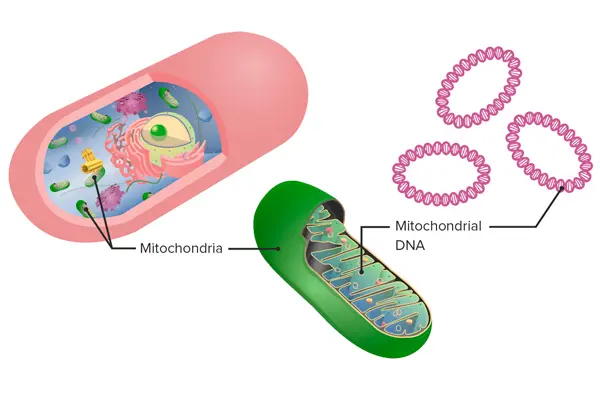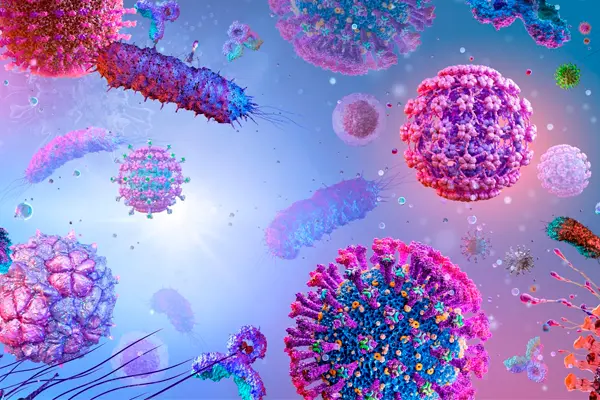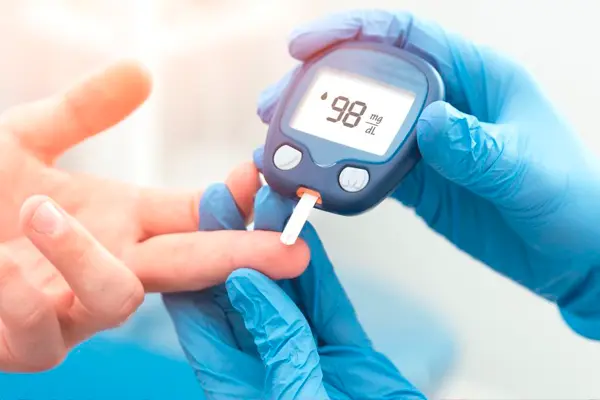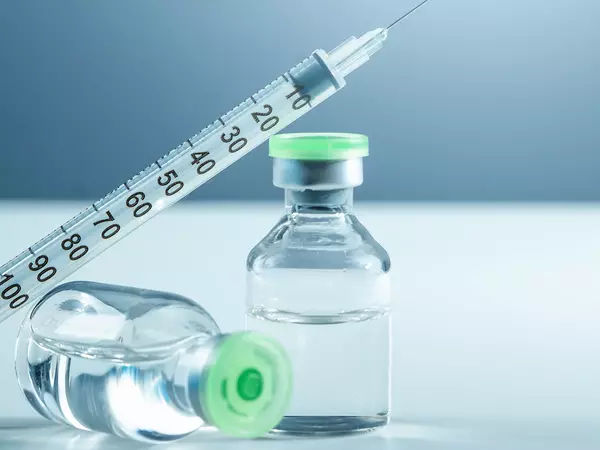Mitochondria dna

If you tested your DNA with a personal genomics service like 23andMe, AncestryDNA, FamilyTreeDNA, MyHeritage or another testing company, you can learn more about your risk factors for hundreds of diseases. By clicking the button above ⬆️, you can upload your raw DNA data file and receive a personalized 250-page health report with research links that is the most comprehensive.
The mitochondria contain circular chromosomes known as mitochondrial DNA and are organelles responsible for cellular energy production and other metabolic tasks. These structures are located in the cytoplasm, with offspring inheriting their mother's mitochondria, along with its genetic material. As a consequence of this inheritance pattern, they also inherit her mitochondrial DNA.
The function of mitochondria is to transform the energy from food into a usable form for cells, and they exist as structures within each cell. A high number, ranging in hundreds to thousands can be seen situated in cytoplasmic fluid surrounding nuclei. Despite DNA being mostly contained inside chromosomes housed within the nucleus itself, there is also some unique genetic material present solely in mitochondria - referred to as mitochondrial or mtDNA. Roughly spanning 16,500 base pairs of DNA blocks specifically relating only to humans composing meagre quantity compared overall cellular total amount of DNA bases therein stored by an organism's genome construction process .
All 37 genes present in mitochondrial DNA are crucial for maintaining regular mitochondrial operations. Out of these, thirteen provide a blueprint for creating various enzymes that play a role in the process of oxidative phosphorylation which generates adenosine triphosphate (ATP) as an energy source through the use of oxygen and simplex saccharides by cells. The remaining genes outline steps involved in producing transfer RNA (tRNA), and ribosomal RNA (rRNA), related to DNA at chemical levels. What tDNA does is it helps combine protein-building blocks known as amino acids to create fully functional proteins along with rRNA assistance during assembly processes.
The DNA in mitochondria, which are responsible for producing ATP - the primary energy source for our cells, is worthy of discussion especially among those dedicated to endurance sports like myself. Increasing mitochondrial count through training helps muscles withstand exertion placed upon them during physical activities. With a unique feature amongst other organelles - their own distinctive DNA and genetic inheritance exclusively from mothers- studying your "mitochondrial haplogroup" can shed light on maternal lineage histories dating back centuries.
Follow the link of the selected polymorphism to read a brief description of how the selected polymorphism affects Mitochondrial function and see a list of existing studies.
SNP polymorphisms related to the topic Mitochondrial function:
| rs1051266 | The protein encoded by the gene transports folic acid into the cell and thus plays a role in the intracellular regulation of folate concentration. In this genotype, folate absorption is worse. Folic acid requirement is higher. Alcohol consumption is more critical for the risk of vitamin B9 deficiency. |
| rs2236225 | Possible increased risk of fetal birth defects. A 1.5-fold higher risk for Caucasian mothers to give birth to children with DNT (neural tube defect). The association in children with this mutation with an increased risk of heart defects is greater if their mother did not get enough folic acid during pregnancy. The risk is reduced with adequate levels of folic acid and vitamin B6. |
| rs4880 | Polymorphism of antioxidant enzymes as risk factors for complications, leads to increased oxidative stress. Affects the level of selenium in serum. |
| rs1801394 | Polymorphism can lead to elevated homocysteine levels independent of folic acid, vitamin B12 or B6 levels. It is a risk factor for neural tube defects and Down syndrome in the setting of higher homocysteine levels. |
| rs35859650 | Myoadenylate deaminase deficiency is associated with myopathy, with progressive muscle weakness and atrophy. |
| rs34677591 | Mutation of SDHD, a mitochondrial complex II gene increases the likelihood of paraganglioma disease. |
| rs11214077 | Mutation of SDHD, a mitochondrial complex II gene increases the likelihood of paraganglioma disease. |
| rs33927012 | Mutation of SDHD, a mitochondrial complex II gene increases the likelihood of paraganglioma disease. |
| rs2307449 | Mitochondrial DNA polymerase mutation associated with reproductive aging, early menopause. |
| rs10064631 | Methionine synthase deficiency, impairing the metabolism of folic acid B9 and cobalamin B12. |
| rs1024611 | Increased risk of exercise-induced ischaemia. Also increased rate of HIV progression. |
| rs16941667 | Genetic variability in aldehyde dehydrogenase is associated with increased risk of gastric cancer. |
| rs7946 | Genetic polymorphisms in methyl group metabolism DNA methylation in peripheral blood. Affect the human need for choline (vitamin B4). |
| rs11754661 | Genetic alteration of the folate pathway affecting genomic methylation content. |
| rs17349743 | Gene responsible for folate pathway abnormalities, increases likelihood of late-onset Alzheimer's disease. |
| rs1800779 | Gene polymorphisms are associated with cardiovascular disease risk markers, impaired methylation. |
| rs162036 | Disorders of intracellular metabolism of cobalamin. Positive effect on the efficacy of folic acid therapy in patients with hyperhomocysteinaemia. |
| rs7703033 | Causes decreased concentrations of vitamin B6, vitamin B12, folic acid and increased homocysteine in the blood. |
| rs17602729 | AMPD1 gene polymorphism, is associated with speed, endurance and strength. |
| rs671 | A mutation in the mitochondrial aldehyde dehydrogenase (ALDH2) gene increases acute alcohol sensitivity, alcohol dependence and hangover susceptibility. |
| rs2297518 | A genetic polymorphism in the nitric oxide synthase gene is associated with oxidative stress. |
| rs2073643 | A breakdown that increases the risk of asthma. |
| rs11585941 | |
| rs12770829 | |
| rs4244593 | |
| rs968529 | |
| rs999571 | |
| rs2238151 | |
| rs3783637 | |
| rs4850 | |
| rs4869089 | |
| rs1985908 | |
| rs16941669 | |
| rs2778475 | |
| rs7254913 | |
| rs1244414 | |
| rs1104739 | |
| rs34095989 | |
| rs926938 | |
| rs12985380 | |
| rs3786625 | |
| rs11203289 | |
| rs2307440 | |
| rs2307441 | |
| rs3087374 | |
| rs12873870 | |
| rs667226 | |
| rs536662 | |
| rs3790694 | |
| rs25683 | |
| rs1076991 | |
| rs1532268 | |
About The Author
Li DaliLi Dali, a National Foundation for Outstanding Youth Fund recipient, is a researcher at the School of Life Sciences in East China Normal University. He earned his PhD in genetics from Hunan Normal University in 2007 and conducted collaborative research at Texas A&M University during his doctoral studies. Li Dali and his team have optimized and innovated gene editing technology, leading to the establishment of a world-class system for constructing gene editing disease models.


